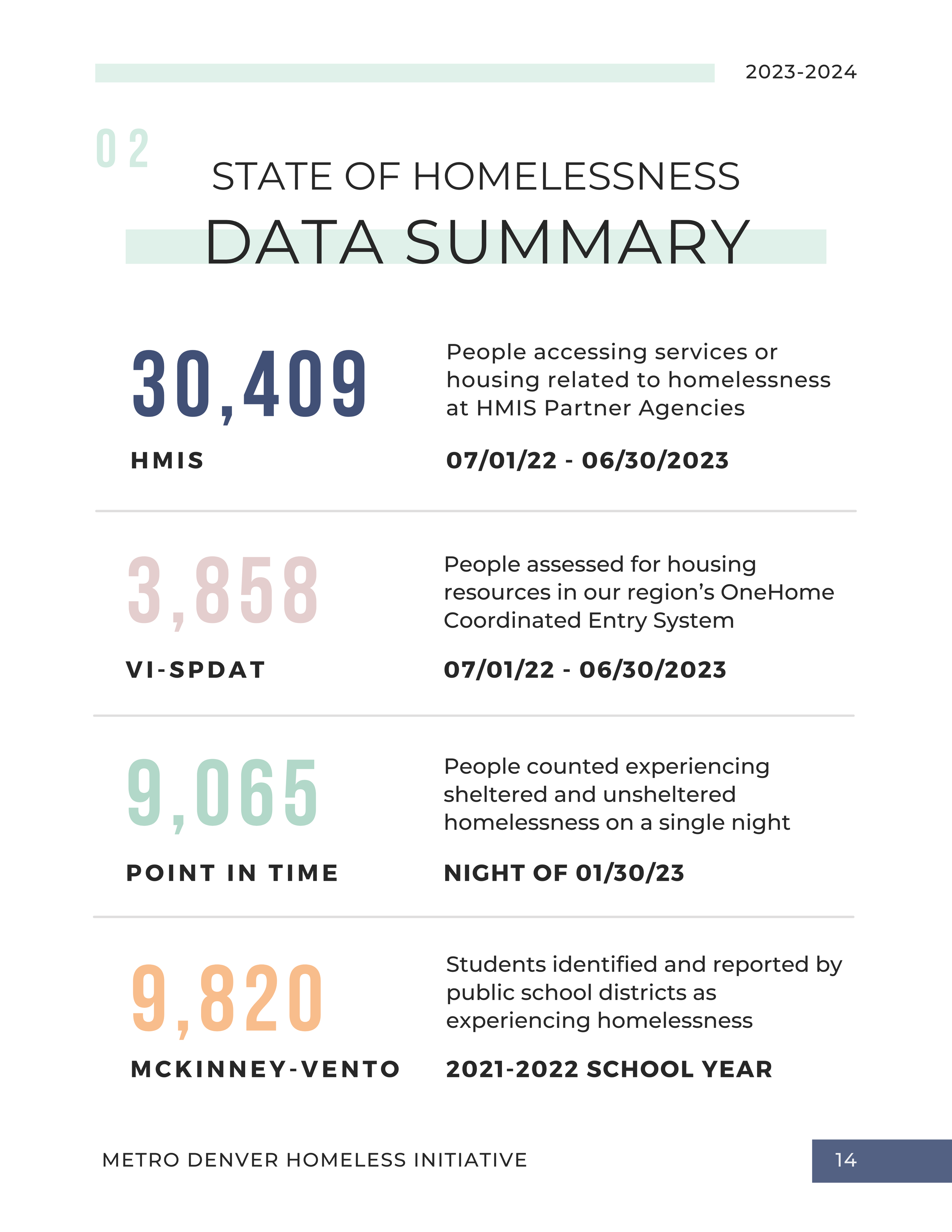State of Homelessness
Social Media Toolkit
The State of Homelessness is our region’s most comprehensive report on homelessness, using data from HMIS, Coordinated Entry Assessment, the Point-in-Time count, and the Colorado Department of Education to depict the overall nature of homelessness in metro Denver.
Below, are key data points from the report in shareable infographics for use by the general public and partner agencies.
Please contact layla.said@mdhi.org with questions.
Homelessness is solvable.
Key messages
Homelessness is a reflection of systemic failures rather than personal shortcomings, by and large.
The housing wage for a two-bedroom apartment is $35.84/hour. The average minimum wage in the metro area is $14.17.
The #1 contributing factor of homelessness is relationship problems and family breakup
The #2 contributing factor of homelessness is an inability to pay rent or mortgage
94% did not choose to experience homelessness.
88% of respondents since 2015 reported a last permanent address in Colorado. People are not moving here to experience homelessness.
More people are newly homeless (44%) than chronically homeless (30%), especially among families (50% vs. 13%)
We know every veteran experiencing homelessness by name in 5 out of 9 subregions and have a goal of full regional coverage by the end of 2024.
Plug & Play
Social Media
Share any of our social media content as a set or one-off post to spread the facts about homelessness in metro Denver. Tag us at @MDHICoC along with #StateofHomelessness and #HomelessnessIsSolvable.
-
Once in Canva, click “File” in the upper left corner, then “Make a copy.” Edit the file, download, and share!
-
Tag us @MDHICoC if you share State of Homelessness content! Here are some ideas:
Film a video (30-60 seconds) of a team member sharing one thing that is at stake if we don’t solve homelessness and one proof of what’s possible.
Film a video (1-2 minutes) reading copy from one of our social posts.
Film a video (30-60 seconds) discussing the needs of people experiencing homelessness.
-
Use this as your primary content or its caption. If you choose to develop your own messaging, please include the hashtags #StateofHomelessness, #EndingHomelessness, or #HomelessnessIsSolvable. You can also tag @MDHICoC and your other partners!
Homelessness is a reflection of systemic failures rather than personal shortcomings, by and large. 🏠#StateofHomelessness #HomelessnessIsSolvable
The moment demands we recognize what is at stake if we don’t solve homelessness. 🏠 #StateofHomelessness #HomelessnessIsSolvable
The #1 contributing factor to homelessness in metro Denver is relationship problems and family breakups. #StateofHomelessness #HomelessnessIsSolvable
94% of people in our region’s HMIS database said they ‘aren’t choosing homelessness.’ 🏠 #HomelessnessIsNotAChoice #StateofHomelessness #HomelessnessIsSolvable
Homelessness is solvable. Our community is already proving it. Learn how at mdhi.org 🏠 🎉#HomelessIsSolvable #EndHomelessness
Share the Facts. Support Our Unhoused Neighbors.
-

HMIS Totals by Subregion
Share our State of Homelessness HMIS Total post, highlighting the number of people accessing housing and services related to homelessness at HMIS Partner Agencies by subregion.
-

Conditions & Barriers
This Point in Time data helps us understand the makeup and challenges of our local unhoused population. Many people experience more than one of these conditions and barriers.
-

Regional Racial Disparities
Across data sources, the following races are overrepresented in homelessness: Black, Native Hawaiian/Pacific Islander, American Indian/Alaska Native, and multiracial.
-

Subregional Race Disparities
How much are certain races overrepresented in homelessness? Information by county.
-

Top Causes or Factors
There are many causes of homelessness, and no list is exhaustive. Sometimes there is no singular cause, but rather several contributing factors.
-

Is Homelessness a Choice?
94% of respondents from the region’s HMIS did not choose to experience homelessness.
-

Moving Here to 'Be Homeless'?
People are not moving to Colorado to experience homelessness. 88% of respondents lived in Colorado prior.
-

Metro Denver's Housing Wage
How much do you need to earn to afford a one or two-bedroom apartment in the Denver metro area.
-

Built for Zero
The region’s model for ending homelessness, adopted from Community Solutions.



